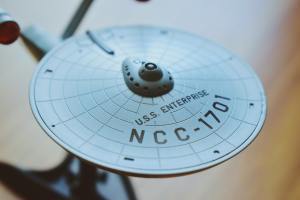The Once and Future Star Trek

Photo by Stefan Cosma on Unsplash
In a recent blog post, Guy Stewart called out some things that he sees as problems in the overall direction the Star Trek franchise has taken in recent years. Here’s a brief summation of those objections:
It’s stuck behind a paywall, essentially denying low-income families the opportunity to watch
It now caters to an older, white, affluent, male audience
It’s abandoned the original “Boldly go,” Wagon Train to the Stars mission Roddenberry gave it
It’s abandoned the utopian hopefulness of the original Star Trek Series
(A note: I have not seen Star Trek: Discovery, so I won’t be discussing it much here.)
Let’s start with the first two objections because they’re more easily addressed. I agree, in part, with Stewart’s annoyance that ALL Trek is now hidden behind paywalls of one kind or another. Up until Star Trek: Discovery, all Trek shows aired on broadcast TV either directly or via some manner of syndication. Putting it behind a paywall does deny low-income families easy access to the Trek franchise. No argument on that point. But there are financial realities at play here as well.
Science fiction programming is some of THE most expensive programming to create. Whether you do it digitally or with practical effects, science fiction shows need special effects. Shows set in space need a lot of special effects. That costs money both during production and in post-production. The last report I saw put Discovery’s per-episode budget at $8 million.
Earlier Trek series, such as TNG and DS9 handled financing by operating as first-run syndicated shows. In essence, the shows were made with the expectation of selling the episodes to lots of and lots of stations across the nation and then internationally. That worked pretty well for TNG and DS9 (along with shows like Hercules and Xena) because it was the late 80s and early 90s, when stations often clambered for syndicated shows to air on weekends or in late-night programming blocks. Voyager survived on a combination of first-run airing on UPN followed by syndication of those episodes.
By the early 2000s, however, first-run syndication of scripted series was winding down as a practice. That may help explain why UPN footed the entire bill for Enterprise and ran it as an in-house production. The show only went into syndication after the series ended. That also helps explain why the ratings decline, meaning advertising revenue decline, signed the show’s death sentence at the end of season 4. There was no external syndication money coming in to help justify its continued existence.
Let’s fast forward to 2014/2015, when CBS was considering and approving Star Trek: Discovery. By then, first-run syndication of scripted series was functionally dead. So that wasn’t an option. The show was going to cost a bundle to make. CBS already has a full prime-time slate that includes ratings monsters like The Big Bang Theory and three NCIS shows, along with proven entities like Elementary, Survivor, The Good Wife, Thursday Night Football, Hawaii 5-0, 60 Minutes, 48 Hours, and Blue Bloods. Everyone is saying that streaming is the big thing. What do you do? You put this high profile show behind a streaming service paywall to help bring in subscribers and pay for this REALLY expensive series.
Does that mean that Discovery and later Picard cater to a more affluent, white, and presumptively male audience? Yep, it probably does because those are the people who are willing to pay to keep the show in production. Whether there’s a moral dimension to this is questionable, since television is a business that has to make money to stay in business.
Plus, ViacomCBS is a publicly-traded company, which means it has fiduciary responsibilities to its stockholders. If this move to put all Trek behind paywalls also keeps new Trek shows in production by keeping them profitable, I’d argue that’s a modestly better situation (ethically) than zero new Star Trek in production. Not to mention that I can’t even remember the last time I saw a Trek show airing anywhere on broadcast TV.
Okay, now we move on to the stickier objections. These objections are, I believe, interconnected, but I’ll do my best to tease them apart.
Stewart specifically decries that “…NO TEENAGER WILL EVER BOTHER TO WATCH STAR TREK…” (caps are from source) because, essentially, Picard is about an old man whining about his regrets. There is some truth to this complaint, but it raises a basic question. Were teenagers ever really the target audience for modern Trek?
Sure, I watched TNG and DS9 as a kid/teen, but those shows weren’t especially geared for teens. I watched TNG because my parents tuned in to watch. I watched DS9 of my own volition, but I didn’t grasp a lot of it until I saw it again years later as an adult. Voyager was only teen-friendly in the loosest sense. Enterprise was squarely aimed at adults. Of all the Trek series, I think that only the original series could really be considered teen-friendly fare.
So, the criticism that Picard doesn’t appeal to a teen audience isn’t especially strong. It wasn’t ever meant to appeal to teens. It’s just the latest in a string of Trek series meant to be consumed and enjoyed by adults. Electing to focus on a former Starfleet officer past his prime and with a guilty conscience isn’t a failure, in my opinion. It opens the doors to a lot of interesting questions. The real sin was the failure of the show to ask those questions in a good, narratively-compelling way.
The whole “Boldly go” Wagon Train to the Stairs mission that Roddenberry pitched all those decades ago sounds good on the surface. Yet, it’s always struck me as some kind of weird byproduct of a decidedly Manifest Destiny cultural world view. The original wagon trains headed out to help “settle” the Wild West. Yet, this all came after bloody conquests for territorial control, during a civil war, and coincided with a lot devastating, paternalistic actions on the part of the government and military of the time toward the native peoples who already lived on that “unsettled” land.
The original series strikes me as happening not too long after similarly bloody territorial conquests with Kirk and Co. heading out to do a land survey for future settlements. Kirk certainly adopts the attitude of a representative of a paternalistic society that knows better than the locals what should be done. He routinely interferes with the cultures they find, even the peaceful, stable ones, while making moral speeches about right and wrong…you know, immediately after or concurrently with violating the most important ethical guideline the Federation has.
Roddenberry cherry-picked a time in societal development where the Federation was seemingly post-expansionist, ostensibly democratic, and had outgrown basic stupidities like racism, sexism, fascism, and nationalism (which is maybe possible), but also – in contradiction to everything we understand about human nature – had apparently evolved out of more basic human failings like greed, unchecked ambition, and innate human violence (which is deeply implausible). This highly specific scenario let him sidestep all of those murky moral questions about how the kingdom was built before the republic was established.
Something we also need to bear in mind is that the Enterprise is, before all else, a military vessel. As Starfleet’s flagship, the Enterprise is presumably one of the most powerful warships in the fleet. No matter how benign their intentions, every mission carried out by Kirk and his crew was backed by the implicit threat of all that firepower floating in orbit. It’d be a little like the U.S. Army parking an M1 Abrams tank on your lawn and then having a lieutenant colonel knock on your door to talk about establishing friendly relations with the Household of Bob and Susie. It might seem benign to the lieutenant colonel because the tank was his ride, but it wouldn’t seem that way to Bob and Susie.
As viewers and fans, we let most of that slide and just say, “Yeah, sure, okay. It’s a utopia,” because Roddenberry and the writers set up the conflicts with such obvious bogeymen. The Klingons and Romulans were monolithic, hostile cultures. The crew squared off against intolerance in multiple shapes, as well as a gangster society, and a burgeoning Nazi regime. In that context, yes, we’ll take the benign, paternalistic, but not obviously homicidal or stupid Federation as the good guy.
Most of us ignore the profoundly weak scaffolding on which that utopia stands because we all know that Roddenberry was engaged in a semi-covert war on the social ills of his time. Plus, the television landscape was a very different animal in those days. The kind of highly-serialized, thematically complicated fare we’ve come to expect just didn’t exist then because it could never have gotten to air. So, we forgive the original series its many, many flaws and say that it was utopian and hopeful. It holds those descriptors pretty uneasily though.
More contemporary Trek shows have been persistently, if slowly, chipping away at the unearned label of utopia and replacing it with a more realistic society. A society where bad things happen to people in the Federation. Military operations go wrong in unexpected and spectacular ways. Failures like arrogance (here’s looking at you Jean-Luc Picard) can derail a career or even a life. Does that come at the expense of the hopefulness of the original series? It does, but the original series offered a false hope based on an unrealistic promise of a human society free from essential human failings.
It doesn’t mean that Trek has abandoned hope entirely. The whole of Star Trek: Picard is about hope. It’s about the hope that one might be able to right, at least a little, the wrongs of the past. It’s about the hope that individuals can make each other’s lives better through word and deed. It’s about the hope that flawed but important institutions can be redeemed. That is a more honest kind of hope that responds to very present social ills that we face today. That Picard didn’t deliver that hope through better storytelling is a problem, but one that can only be solved behind the scenes in the writing.
Expecting contemporary Trek shows to hew religiously to the vision and approach set out by Gene Roddenberry nearly 60 years ago isn’t practical or productive. If Trek is to survive and inspire, it needs to do it in ways that speak to people now. That means tossing the false utopia and acknowledging that societies have problems, but showing those problems can be surmounted. The solutions may be as imperfect as the people who devise them, but progress is feasible, achievable, and hope is part of that process.



